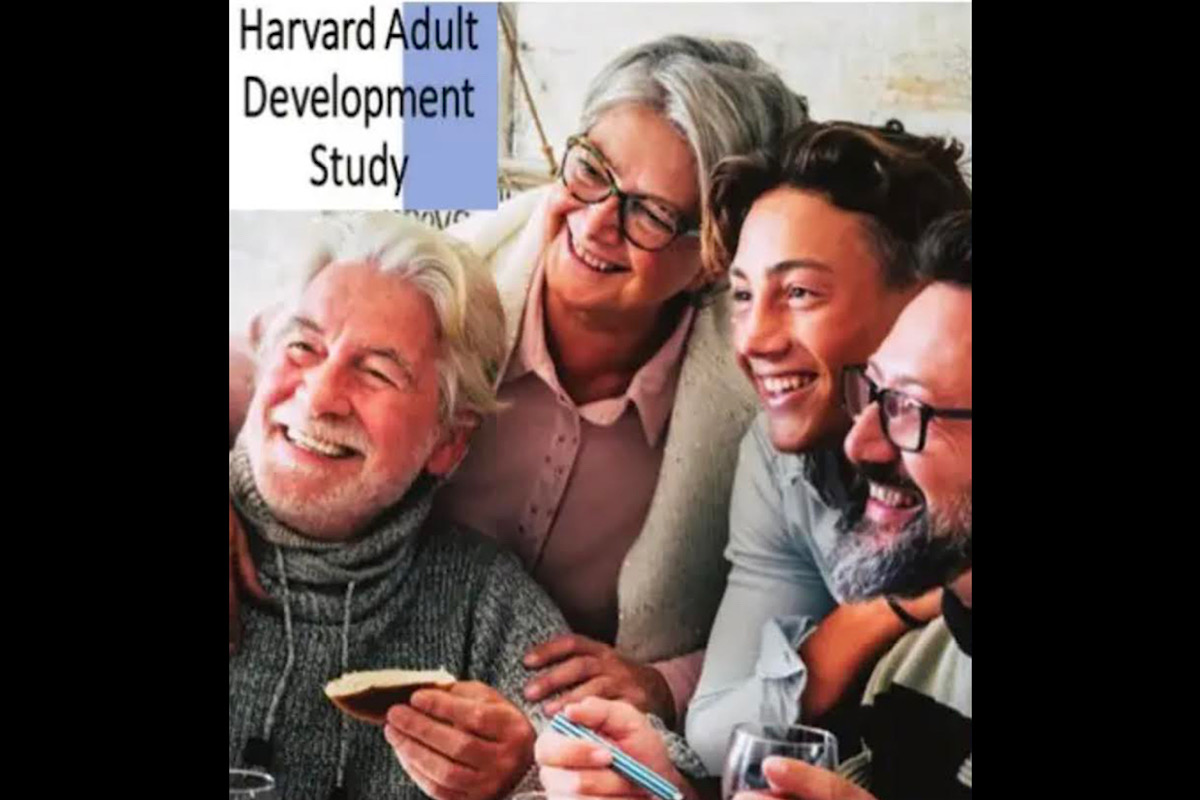The world’s longest study on happiness ~ the Harvard Study of Adult Development ~ began in the 1930s in which researchers tracked 700 people in the Boston area over eight decades, and continuously gathered data on different aspects of their lives ~ their health, income, marital status, etc., and also on their hopes and fears, accomplishments and disappointments, satisfaction and regrets.
Findings from this longitudinal study were parsed over the years to identify the patterns that emerged. The study’s current director and associate director, Robert Waldinger and Marc Schulz, have put these findings in a 2023 book called “The Good Life: Lessons from the World’s Longest Scientific Study of Happiness”.
“Contrary to what many people think, it’s not career achievement, or exercise, or a healthy diet”, they said in an interview, “These things matter a lot. But one thing continuously demonstrates its broad and enduring importance: Good relationships.”
People who are more connected to family, friends and community ~ obviously not in the sense of WhatsApp or Facebook connections ~ are happier and also physically healthier than people who are less well connected. “If we had to take all 84 years of the Harvard Study”, they said, “and boil it into a single principle for living, one life investment that is supported by similar findings across a wide variety of other studies, it would be this: Good relationships keep us healthier and happier. Period.”
This gives us a key to happiness through nurturing of good relationships rather than pursuing other goals like making money. People’s lives often do not play out as planned. Some suffer losses of loved ones, income, jobs, accidents, traumas, etc., and some suffer these early in their lives and must carry their devastated baggage which they find crippling.
Some by nature are introverts and cannot forge relationships easily, and some because of their work cannot stay at a place for long enough to develop meaningful relationships.
Some get lonelier with age, after losing their partners. There may be cultural practices that cause inequity, economic factors that cause inequality and systemic factors that cause discrimination ~ all these exact a toll on our happiness. Strong relationships help us become a little more resilient to face such difficulties, but the rat race and busy-ness of life keep us away from giving enough time to relationships.
To draw some insights from their book: First, relationships keep us happier and healthier throughout our life, while loneliness erodes our health. Second, relationships require nurturing, maintenance and renewal. Third, relationships, like life, are complicated; they bring their pains and challenge together with love and joy, and it is impossible to have one without the other. As they said, “A good life, in fact, is forged from precisely the things that make it hard.
Challenges are opportunities for growth. Learning how to navigate relationship challenges better is key.” Fourth, because life is uncertain and our time is limited, how to spend this limited time is important. Most of us spend several hours everyday with mobiles and before computer screens rather than with the people we love.
Foundation of a happy life can be laid by prioritising our relationships with people over gadgets. Fifth, and most important, it is never too late to start and improve our connections with others. “We live in a world that hungers for greater human connection.
Sometimes we might feel that we are adrift in life, that we’re alone and that we’re past the point where we can do anything to change that.” But people in the study have proved otherwise. One gentleman who lived a difficult and isolated life, had to give up his job due to health problems at 67 and got divorced too at the same time, becoming lonelier than ever and very unhappy.
Then he started going to the gym, and could finally develop close friendships with like-minded people to get over his loneliness, proving that it is never too late to forge new bonds. Relationships need not be restricted to humans alone, there are many who forge strong bonds with animals and are very happy with them. And of course, there is Nature, which deserves a separate article.
As already stated, happiness is a state of mind, and no state of mind is permanent. Every feeling is fleeting and changeable, and the jetsam and flotsam of life often overwhelm even the happiest.
Happy people are also equally prone to feelings of anger, frustration, loneliness, and even sadness from time to time, just as unhappy ones may also feel pleasure, contentment and joy at times. But faced with negative emotions, happy people are much better equipped to deal with them through their positive outlook.
Data shows that happy people are generally more successful in multiple life domains like marriage, friendship, income, job, and health; they have more friends and create better support systems, they navigate life’s turbulences more easily. They also exercise positive influence on others by encouraging them to seek happiness.
Research suggests that a part of happiness may be linked to genetics too, though its share is uncertain, varying from 10 to 50 per cent. Aristotle made a distinction between two kinds of happiness: Hedonia, happiness that is derived from pleasure and Eudaimonia, happiness that is derived from meaning.
Modern psychology adds a third, engagement ~ a commitment and participation in different areas of life, like volunteering for a cause one believes right, social work that brings meaning by improving the lots of others.
All the three play important roles in the overall subjective experience of happiness, though their relative values will differ from person to person. Actually, happiness is the sum total of all experiences that make life worth living and impart a meaning to it. Happiness is not the same as meaning, though they often overlap, but without some meaning, living would be a most mundane experience of going through a dull routine of performing a series of daily habits. Quest for a meaning is what make us uniquely human.
Psychologists have tried to outline the distinction between happiness and meaning, like Scott Barry Kaufman at Scientific American (2016), who gave many examples, like “Finding one’s life easy or difficult was related to happiness, but not meaning”, while “Helping people in need was linked to meaning but not happiness”, or “Happiness was related more to being a taker rather than a giver, whereas meaning was related more to being a giver than a taker”.
Unlike us, our ancestors were not fixated on happiness; they thought it was matter of chance. The root of the word “happy” in all Indo-European languages is cognate with the word for “luck”. The word for happiness in Greek is eftychí, ef meaning good and tychí meaning luck.
The English “happy” is cognate with “hap” in Old Norse, meaning luck again. French bonheur or happiness derives from “heur” or good fortune, and the German word for happiness, “gluck”, also means chance.
The Sanskrit word for happiness, “sukha”, derives from ‘su’ meaning ‘good’, and ‘kha’ meaning ‘aperture’; its original meaning was ‘having a good axle-hole’ which is nothing but a chariot. Rig Veda used “sukha” to mean “running swiftly and smoothly”. Running smoothly through life ~ may be that is why happiness is needed. Can anyone deny that chance plays a role in our smooth transition through life?
Ogimi Village in the Okinawa Prefecture in Japan, known as the “village of longevity” has an unusual concentration of senior citizens above 100 who are unaffected by the burden of age. Two Spaniards, Héctor Garcia and Francesco Miralles, spent some time in that village, interviewing people to find the secret of their longevity, based on which they wrote a book “Ikigai:
The Japanese Secret to a Long and Happy Life” which prescribes 10 principles for a happy, healthy and long life: stay active, don’t overeat, take it slow, get in shape, live in the moment, reconnect with nature, smile, surround yourself with good friends, be grateful, and follow your Ikigai. Ikigai in Japanese means “reason for being”, which most of us do not know. Searching for one’s “ikigai”~ a meaning for life ~ can also be a worthy goal to pursue in life.
American psychologist Martin Seligman (2002) argued that happiness has three dimensions: experience of pleasantness, engagement in satisfying activities and sense of a meaningful life. Psychologists Sirgy and Wu (2009) added another dimension to these three: a balanced life, because the satisfaction derived from a single life domain is often limited.
One needs to be involved in multiple domains to satisfy a broad spectrum of human needs, physical as well as spiritual. This brings to mind what ancient Indian philosophy says about happiness (sukha).
The Chandogya Upanishad says, “yo vai bhuma tat sukha? nalpe sukhamasti” ~ there is no happiness in that which is small, limited, or short-lived. Finite is the seed of unhappiness, limit breeds unhappiness. Real happiness lies only in the infinite, the bhuma.
As long as we allow our mind to be confined to the limited world of sense experiences, meaning pleasure, we cannot be happy. To attain the state of bhuma, we must go beyond the sensual experiences, and then we would cease to have any other need. As the Gita says (VI.22): “ya? labdhva chapara? labha? manyate nadhika? tata?” ~ Having attained that, one does not strive for anything higher.
(The writer is a commentator, author and academic. Opinions expressed are personal)












